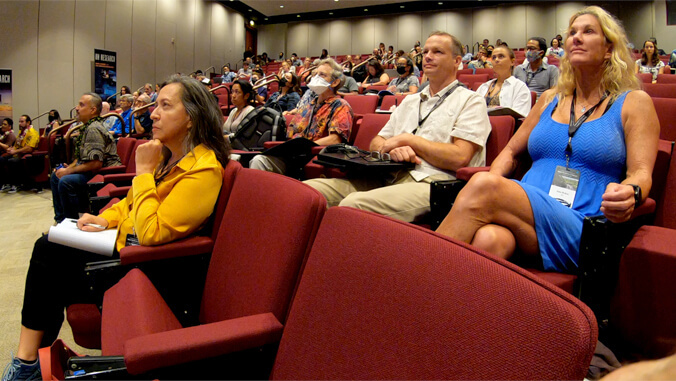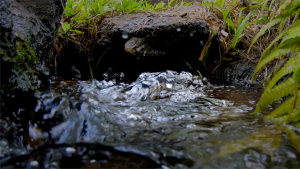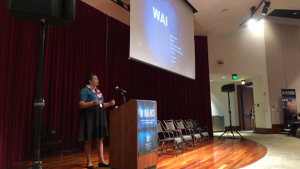
Water is our most important resource, and it has become more critical than ever to develop resilient and sustainable practices for future generations to thrive.

To foster collaboration and partnerships between water experts and policymakers, the University of Hawaiʻi hosted “Water Resilience in Hawaiʻi” on October 28, at the Hawaiʻi Convention Center. Approximately 200 participants attended the conference that brought together academic researchers from UH, and UH’s industry and community partners, to engage in meaningful partnerships to solve challenges, while promoting economic stability and viability in Hawaiʻi.
“The University of Hawaiʻi is a research institution that has a lot of expertise on water and all types of issues,” said Vassilis L. Syrmos, UH vice president for research and innovation. “With our laboratories and excellent faculty we can actually solve a lot of these issues.”
Cultural and historical perspectives
A major focus of the conference was on the cultural and historical approaches to water management in Hawaiʻi. UH experts, including those who are involved with important cultural organizations in Hawaiʻi, shared their ʻike and manaʻo (knowledge and thoughts).
“Traditional practices are actually sciences and technology and spiritualities. Water is a key component of it that was vital not just for our spiritual needs but also for us to meet contemporary society with,” said Kamuela Enos, director of the UH Office of Indigenous Knowledge and Innovation.

Enos opened the conference with an oli (chant), followed by remarks from UH President David Lassner and Juanita Kanehailua Wolfgramm, vice president of the conference’s title sponsor Native Hawaiian Community Development Corporation and UH Mānoa alumna. UH Mānoa Pacific Biosciences Research Center Assistant Professor Kiana Frank delivered the morning keynote address on how her connections to water in Windward Oʻahu helped shape her career path to research and connecting it back to the ʻaina (land). This was followed by the first panel on the cultural and historical significance of water in Hawaiʻi.
Other sessions included: Water Policy and Strategy in Hawaiʻi; Challenges, Opportunities, Strategies and Tactics to Address Water Quality Issues in Hawaiʻi; and Red Hill…Moving Forward. U.S. Sen. Brian Schatz and Edward Laws, UH Mānoa emeritus professor of oceanography, delivered the afternoon keynote addresses.
George Yarbrough, innovation and entrepreneurship programs director at the UH Office of Innovation and Commercialization, gave a sneak peek into HITIDE (Hawaiʻi Technology Innovation Development Ecosystem), UH’s new innovation incubator program that provides concierge services, seed funding and resources specifically tailored to meet the unique needs of academic entrepreneurs with UH-affiliated, technology startups.
The conference was sponsored by the UH Office of the Vice President for Research and Innovation in partnership with the Native Hawaiian Community Development Corporation and the Hawaiʻi Technology Development Corporation.

